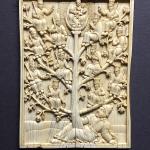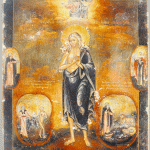
Many Christians imagine Mary, the Mother of God, to be a rather passive figure, a passivity which they attribute to her humility. They have been led to confuse humility with self-deprecation, the kind which leads people to deny their own agency so that they become mere followers of someone else. This kind of conception of humility is used to promote subjugation of people, telling them if they resist those in power, they are being prideful. In the end, such a notion turns humility into a tool for humiliation. True humility will not accept humiliation, as true humility is about coming to know and understand one’s proper place in the world, to know oneself properly, and then to act based upon such self-knowledge. It rejects pride, because pride has us think of ourselves as being greater than we are, but it also makes sure we do not deny our own good qualities and attributes (which is what is had by those who have a false form of humility). Mary’s importance to the world, to world history, is immense, how can it not be, for she is the Mother of God? Not only did she give birth to Jesus, she raised him, and was always with him in his ministry. Mary was with him all the way to the end, when he was on the cross, and it is said, she was the first to see the resurrected Christ. She knew who she was and what it meant, and she acted upon it, as can be seen in the way she addressed Jesus at the Wedding of Cana, telling him to help the host keep the celebration going, even if it required a miracle. Who else could talk to Jesus like that?
Mary was not a passive follower who contributed nothing to Jesus’ ministry; tradition indicates she held a central place in that ministry, with St. Maximos the Confessor in his biography of her indicating she was especially close to the other women who followed Christ, teaching them similar to the way Jesus was with the twelve apostles. More than anyone else, she knew who she was, and what that meant. She knew she could not tell Jesus to abandon his mission, even though as a mother, she knew that she was going to feel the burden of it herself when the powers that be fought against him. She most certainly did not fall into any kind of self-hatred, the kind which many often mistake for humility, a self-hatred which usually is the result of wounded pride.
It seems that one of the reasons why many want to envision Mary as being passive and completely submissive, without any indication of her own personal agency, is that they want to use that to tell all women they should be the same. They want women to be simply submissive, doing what they are told, with little to no active engagement of their own. But this is simply not who Mary is. The greater tradition concerning Mary gives a different kind of Mary, one with much authority, an authority which others, including angels, could and would listen to and follow. Archbishop Raya reflected upon the way traditional Byzantine hymns for the Annunciation represent the tradition which some in the West tried to override and ignore:
Mary’s strong personality and grandeur of character are all in this dialogue. In her there is nothing primitive, no sweet-scented banality or weak pietism. She is not a little girl, docile, blindly obedient, and all submissive to a domineering male as she was stereotyped by the piety of the Middle Ages. Her femininity towers above the archangel and borders on the divinity.[1]
Mary was chosen to be the Mother of God. She is seen as more honorable and beyond compare to all the angels. How can this be if she is to be seen as some sort of weak women, with a very limited range of activity? To be the Mother of God, she had to accept the role as it was presented to her, to make it her own. She gave her whole self over to God, yes, but we all are expected to do that, not by going into some sort of quietist retreat from activity but by acting with God in all that we do. And this is what she did, all the way to the end. She went to Jesus when he was on the cross, while most of his other disciples fled and went into hiding. She towered over them by her act of her courage: there was nothing weak, nothing passive about her. She shows us, contrary to the way many have made women to be in the Christian tradition, there is nothing about being a woman which means they must mind their place and let all the men take over and by the only ones who are active agents in the world. We must look to Mary, and put aside that defiled picture of her, that one which is used to affirm the worst forms of sexism and let the true Mary appear to us, the Mary willing to take on the powers that be:
And Mary said, “My soul magnifies the Lord, and my spirit rejoices in God my Savior, 48 for he has regarded the low estate of his handmaiden. For behold, henceforth all generations will call me blessed; for he who is mighty has done great things for me, and holy is his name. And his mercy is on those who fear him from generation to generation. He has shown strength with his arm, he has scattered the proud in the imagination of their hearts, he has put down the mighty from their thrones, and exalted those of low degree; he has filled the hungry with good things, and the rich he has sent empty away. He has helped his servant Israel, in remembrance of his mercy, as he spoke to our fathers, to Abraham and to his posterity for ever” (Lk. 1:47-55 RSV).
Mary’s low estate here is the low estate of all humanity before God; this is her humility, the humility which recognizes the immeasurable greatness of God and how little created nature is in comparison to it. But her lowly estate, her willingness to acknowledge it, is what lifts her up and makes her great, greater than all the angels as the Mother of God. In and through her, God does all kinds of great things in the world. By her words, she confronts the proud, the rich, those who consider themselves to be great and to be obeyed, and she knows that what she began with her words will be taken up by the Word made flesh and find their fulfillment. She will not stand for injustices, for the powers that be which create them; she knows they will be overturned, and that her relationship with Jesus gives her a central place in the justice which Jesus unleashed. Mary, who was greatly elevated on earth, found her cooperation with grace made her even greater in heaven, so that even now, we have a great woman looking after us, taking on the powers that be, that is the men and women who, in their pride and arrogance, would take on and hurt those in need:
The greater the gifts of love we receive, the more we have to share with others. Upon entering into her glory in heaven, Mary was full of grace. She was already declared full of grace by the Angel Gabriel when the Holy Spirit overshadowed her and she surrendered completely to serve her Lord in her humble lowness (Lk 1:38). Yet, she grew in love of God as she allowed God’s love in her to make her more open, more present, more serving to all who needed her. How she must have grown in grace as she served her Son, Jesus of Nazareth, for 30 years. How that grace must have reached a fullness at the foot of the cross that pained her to want to be present to each person in order that the blood of her Son might not be poured out in vain.[2]
Mary is not some weak woman, whose only role was to give birth; she, like all other mothers, had so much more to her life than that. She was conceived in grace and grew in grace and love throughout her life; she was always active, never passive, even as she remains active in glory, looking after and taking care of us, when we come to her asking for her help:
There is no one closer to man, more kindred to the human being than the Mother of God in the heavens. She covers the world [with her mantle], intercedes for it. She is with all creation, over all nature, She is over the waters and the dray lands, the fields and the forests, over humans and creation. She embraces all things in Herself, unites all things – She is a merciful heart to all. After praying to the Lord and while praying to the Lord, pray also to His Mother, the Bearer of the Holy Spirit. Believe that the Mother of God will have mercy and will send you the gift of the Holy Spirit, and you will behold the Son of God living within you.[3]
Let us shake off the impious image made of Mary, the image which has been used to not only undermine her, but women in general. Let us look to her as the Mother of God, but also as a woman, a woman full of grace and power and authority. Women have had, and should continue to have, an active and authoritative role in world history. When they perceive injustices in the world, especially when such injustices relate to the way women have been historically treated, we should not be surprised if they take on Mary’s words and use them to confront those injustices and the biases uses to justify them. Let us see, in and through Mary, that humility does not need to lead to humiliation, and with it, subjugation and silence; rather, it should lead to the opposite, to help people to know themselves and in and through such self-knowledge to become holy and great. This is why those who try to suggest the proper role of women is to be humble, and use that to subjugate them and deny them their proper role in history, must be resisted, for they would deny women (and anyone else) the greatness intended for them.
[1] Archbishop Joseph Raya, The Abundance of Love: The Incarnation and Byzantine Tradition (Combermere, ON: Madonna House Publications, 1989; 3rd ed.: 2016), 27-8.
[2] George A. Maloney, SJ, Communion of Saints (Hauppauge, NY: Living Flame Press, 1988), 88-89.
[3] Sergius Bulgakov. Spiritual Diary. Trans. Mark Roosien and Roberto J. De La Noval (Brooklyn, NY: Angelico Press, 2022), 68-9. [16/29. VIII.1924].
Stay in touch! Like A Little Bit of Nothing on Facebook.
If you liked what you read, please consider sharing it with your friends and family!
N.B.: While I read comments to moderate them, I rarely respond to them. If I don’t respond to your comment directly, don’t assume I am unthankful for it. I appreciate it. But I want readers to feel free to ask questions, and hopefully, dialogue with each other. I have shared what I wanted to say, though some responses will get a brief reply by me, or, if I find it interesting and something I can engage fully, as the foundation for another post. I have had many posts inspired or improved upon thanks to my readers.












